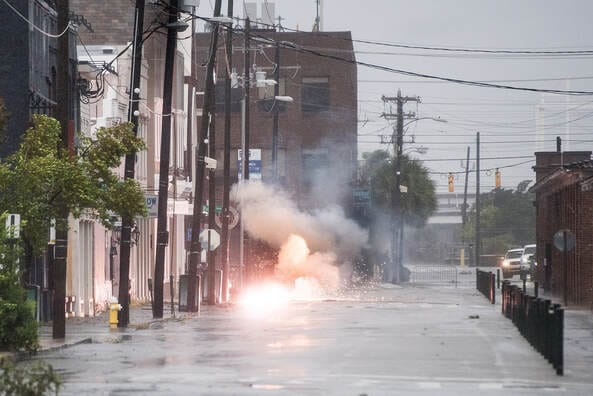Climate Litigation Reaches American South With Charleston, SC Filing Latest Suit

Story originally published by Drilled News
The city of Charleston, South Carolina is going to court to hold two dozen oil and gas companies accountable for alleged deception about the role of fossil fuels in driving climate change.
Charleston filed its lawsuit against 24 petroleum firms in South Carolina state court on September 9, joining around 20 other communities across the country pursuing similar litigation against the fossil fuel industry. Hoboken, New Jersey filed a climate lawsuit just last week against six major oil and gas companies plus the industry’s largest trade association, the American Petroleum Institute. 24 hours after Charleston's announcement, the state of Delaware announced the filing of its climate liability suit, against several fossil fuel companies and the American Petroleum Institute.
The Charleston lawsuit names major petroleum companies and their affiliates such as BP, Chevron, ConocoPhillips, Phillips 66, ExxonMobil, Marathon Petroleum, and Shell Oil.
“As this lawsuit shows, these companies have known for more than 50 years that their products were going to cause the worst flooding the world has seen since Noah built the Ark,” Charleston Mayor John Tecklenburg said in a press release. “And instead of warning us, they covered up the truth and turned our flooding problems into their profits. That was wrong, and this lawsuit is all about holding them accountable for that multi-decade campaign of deception.”
The lawsuit brings legal claims of public and private nuisance, trespass, strict liability, and negligent failure to warn. It also alleges violations of South Carolina’s Unfair Trade Practices Act, a statute that prohibits deceptive practices such as misleading advertising.
This lawsuit, like many of the other climate accountability cases filed against the industry, seeks monetary compensation to help pay for the staggering costs associated with climate impacts like extreme heat, damaging flooding, severe storms and sea level rise.
According to Charleston’s complaint, the South Carolina coastal city has seen flood events increase significantly “from around four days per year around 50 years ago to nearly 89 days per year as of 2019,” and the city “has incurred significant costs on capital projects to address sea level rise.”
These climate cost-recovery lawsuits are aimed at shifting some of the costs onto the companies that are largely responsible for the climate crisis and that willfully engaged in campaigns of deception and disseminating climate denial.
As stated towards the end of Charleston’s 137-page complaint, the fossil fuel companies targeted in the lawsuit “widely disseminated marketing materials, refuted the scientific knowledge generally accepted at the time, advanced and promoted pseudo-scientific theories of their own, and developed public relations materials that prevented reasonable consumers from recognizing or discovering the latent risk that Defendants’ fossil fuel products would cause grave climate changes.”
Charleston further alleges that the firms “deceitfully represented themselves as leaders in renewable energy and made misleading claims that their businesses were substantially invested in lower carbon technologies and renewable energy sources,” and continue to make similar false claims to the public.
As in the other cases, the industry has denied wrongdoing. “There is no merit to the claims,” Chevron spokesman Sean Comey said in an emailed statement. “They are not a serious solution to a serious problem,” he said, but instead “special-interest-promoted lawsuits designed to punish a few companies in one industry who lawfully deliver affordable, reliable, and ever cleaner energy.”
But Charleston’s mayor said he knows from his own time working with the petrochemical industry that oil and gas companies have a long track record of deceiving the public about the harmful risks of their products.
“As the founder of an industrial lubricants business here in South Carolina in the 1970s, I handled their products, and I can tell you from firsthand experience that these companies were not in any way, shape or form sharing information with us about the dangerous flooding and extreme weather their products would cause,” Tecklenburg said in the press release. “In fact, I was hearing the same false and misleading claims from them as everyone else. And now it's time for them to pay for the damage they’ve caused for our residents, businesses and taxpayers.”
Charleston is the first city in the American South to sue fossil fuel firms over climate change. In addition to the Hoboken case, communities in California and in Colorado, Washington State’s King County, the city and county of Honolulu in Hawaii, the city of Baltimore, New York City, Washington, D.C., and the states of Minnesota, Massachusetts and Rhode Island have filed climate lawsuits against the industry outside of the federal courts.
“Big Oil is facing climate lawsuits on both coasts, in the northeast, the midwest, the south, the Rocky Mountains, and even Hawaii,” said Richard Wiles of the Center for Climate Integrity, an initiative that supports climate accountability litigation, in a statement released in support of Charleston’s action. “The public is ready to hold this corrupt industry accountable for causing and lying about climate change, and officials across the country are stepping up to take action.”
Charleston is represented in the case by South Carolina attorney Joseph P. Griffith, as well as the San Francisco-based environmental law firm Sher Edling LLP. Sher Edling is representing roughly half of the 21 communities that are taking legal action against the fossil fuel industry over climate impacts and the industry’s alleged deception.


